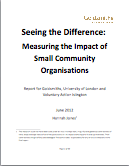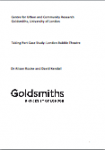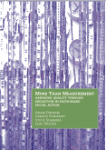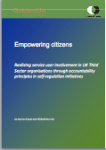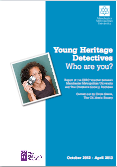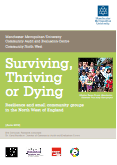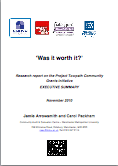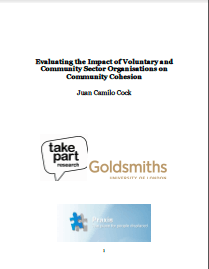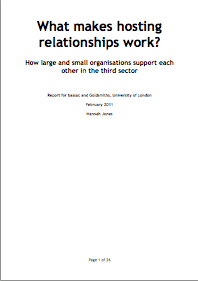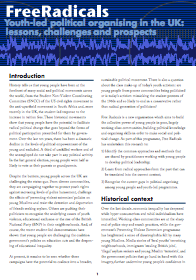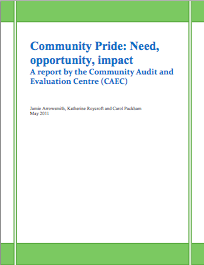The Contribution of Volunteering to Community Cohesion 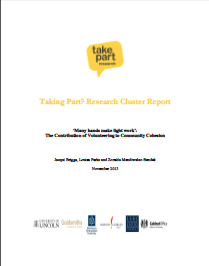 This report describes research undertaken as part of the Taking Part? ESRC Research Cluster, focused on community based learning and active citizenship. It contains findings from a community based research project undertaken in partnership between researchers at Lincoln University with community groups in the Abbey ward in the city of Lincoln, UK. The research used an experiential learning process co-producing knowledge about the value of volunteering in terms of contributions to community cohesion by discussing what nurtures and motivates volunteering, and barriers and opportunities experienced by community groups. Using a mutual reflection and constructed conversations approach, the research project support learning processes to empower people in having a wider participation in their communities. It is building upon the existing learning experiences and volunteering activities. This report describes research undertaken as part of the Taking Part? ESRC Research Cluster, focused on community based learning and active citizenship. It contains findings from a community based research project undertaken in partnership between researchers at Lincoln University with community groups in the Abbey ward in the city of Lincoln, UK. The research used an experiential learning process co-producing knowledge about the value of volunteering in terms of contributions to community cohesion by discussing what nurtures and motivates volunteering, and barriers and opportunities experienced by community groups. Using a mutual reflection and constructed conversations approach, the research project support learning processes to empower people in having a wider participation in their communities. It is building upon the existing learning experiences and volunteering activities. |
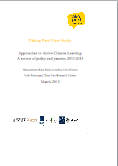 Evolution of Active Citizenship in EnglandThis scoping exercise identifies continuity and change in the environment for active citizenship learning in England, since the change of government in 2010. It maps key initiatives in the range of learning opportunities for active citizenship available between 2010-12 and draws out key elements of continuity and change apparent in their structures, learning approaches and the models of participation they promote. Evolution of Active Citizenship in EnglandThis scoping exercise identifies continuity and change in the environment for active citizenship learning in England, since the change of government in 2010. It maps key initiatives in the range of learning opportunities for active citizenship available between 2010-12 and draws out key elements of continuity and change apparent in their structures, learning approaches and the models of participation they promote. |
Intergenerational learning and social solidarity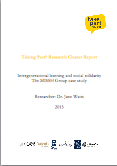 This research report draws on the experience of a group which was working to build social solidarity by working across generations. In the context of current government policy and the Prime Minister’s stated aim of creating a ‘big society,’ it was timely to consider the role played by intergenerational practice in the development of active citizenship. This research report draws on the experience of a group which was working to build social solidarity by working across generations. In the context of current government policy and the Prime Minister’s stated aim of creating a ‘big society,’ it was timely to consider the role played by intergenerational practice in the development of active citizenship. |
|
Seeing the Difference Measuring The Impact of Small Community Organisations |
TUC Swords of justice and civic pillars  The report examines five case studies where unions have developed community networks to organise vulnerable workers, encourage activism, improve access to learning and employment support, strengthen social cohesion and generally promote the benefits of trade unionism. These cases are analysed to assess the advantages and ingredients of successful community engagement. The report examines five case studies where unions have developed community networks to organise vulnerable workers, encourage activism, improve access to learning and employment support, strengthen social cohesion and generally promote the benefits of trade unionism. These cases are analysed to assess the advantages and ingredients of successful community engagement. |
|
TAKING PART CASE STUDY – Stream Arts
|
|
More Than Measurement
|
|
London Bubble Take Part Case study |
|
Empowering citizens – Realisation of User Participation in SRIs
|
Here we Stand: Inquiry into Local Activism & Dissent 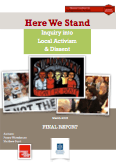 The findings of a UK wide inquiry into activism and dissent, exploring: Where can resistance and alternatives to injustice be found? Where are the homes for such action? National Coalition for Independent Action (NCIA) and Manchester Metropolitan University (MMU). The findings of a UK wide inquiry into activism and dissent, exploring: Where can resistance and alternatives to injustice be found? Where are the homes for such action? National Coalition for Independent Action (NCIA) and Manchester Metropolitan University (MMU). |
|
Young Heritage Detectives CBC report
|
|
Surviving Thriving or Dying, ESRC-CAEC Project Document
|
Learning – Volunteering Community Cohesion in a Rural County 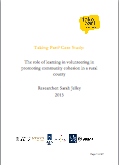 This report presents an analysis of volunteering in the two case studies reinforcing the importance of local volunteers in improving community cohesion. This report presents an analysis of volunteering in the two case studies reinforcing the importance of local volunteers in improving community cohesion. |
Aspirations and Engagement CBC report 2012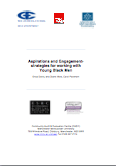 This research solicited the views of community members and young Black men aged 14-19 in South Manchester, on issues relating to young Black men’s aspirations through exploring their participation attitudes towards education, employment, and training as well as opportunities for volunteering. It sought to identify strategies for enabling the effective participation in culturally specific personal development programmes in areas of masculinity, racial identity, emotional literacy community and citizenship. This research solicited the views of community members and young Black men aged 14-19 in South Manchester, on issues relating to young Black men’s aspirations through exploring their participation attitudes towards education, employment, and training as well as opportunities for volunteering. It sought to identify strategies for enabling the effective participation in culturally specific personal development programmes in areas of masculinity, racial identity, emotional literacy community and citizenship. |
|
Was it worth it?
|
|
Evaluating the Impact of Voluntary and CommunitySector Organisations on Community Cohesion |
|
What makes hosting relationships work?
|
|
FreeRadicals: youth-led organising in UK
|
|
Community Pride
|
